- Home
- Laura Purcell
The Poison Thread Page 3
The Poison Thread Read online
Page 3
We didn’t drink quality tea as you’d do it, miss. The grocers cheat you if they think they can: dye the leaves, bulk them up with wheat. Still, it was a treat for me.
‘Do you know,’ Ma said, sitting down by my side, ‘that I am to blame? I made Pa send you to a school where the girls are . . . better off. Young ladies, like I once was. I should have realised they would tease you.’ Her lips pursed, as they did when she tackled a difficult stitch. ‘I’m sorry, Ruth. But you mustn’t mind them. They are silly girls and they will soon tire of it. They’ll find someone else to torment.’
I took a sip of tea and closed my aching eyes. ‘They hate me.’
‘They don’t hate you. I know how these things are, I remember my own school. Always some petty quarrel going on. Girls’ allegiances shift so quickly. Wait until they see your fine needlework! Won’t you be the most popular girl, then?’
I didn’t answer. I just pulled my cloak closer around me.
‘Now, let’s see about this bonnet.’
I couldn’t eat my supper. I sat staring at my plate as the light slipped from the room, queasy at the thought of food, at the thought of myself. Would they be sitting down to supper too, those cruel, conceited girls? I imagined Rosalind Oldacre at a table spread with clean linen, lit by a pair of candlesticks. She pushed her glossy, blonde curls behind her ears and cut up a salmon, taking tiny, delicate bites. If only I could hurt her, the way she’d hurt me. If only I could pick up one of those silver candlesticks and smash in the white teeth. Then she’d know what it was to have girls laugh at her, to feel the shame of her face.
‘Stop it, Ma.’ I set my plate down, untouched, on the floor. The cheese glowed, a miniature moon. ‘You’ll get behind if you work on my bonnet.’
A thought seemed to strike Ma. She smiled with a mouth full of pins. ‘Maybe you can do some of the Metyard work for me.’ She spat the pins out and set them on the arm of her chair. ‘Would you like that?’
Shadows cloaked her, I couldn’t tell if she was serious. ‘What if I make a mistake?’
‘You won’t. I trust you.’
She rose and crossed to the other side of the room. My stomach clenched. The Metyard work! The holiest of holies, the fine fabrics that mustn’t be marked. Mrs Metyard made Ma buy it all in advance from her shop. If the work was late or spoiled, she paid a fine.
‘Look at this. A piece of fancy embroidery if ever we had it. Gloves for a bride.’ She laid the shot silk down on my lap reverently, as if it were a sleeping child. White warp, blue weft. A sheen ran down the shaft of the thumb. Beautiful. The wearer would have moonbeams at her fingertips. Ma had begun to embroider a pattern of orange blossom and myrtle in silver thread on the left hand. ‘I made up that pattern myself, can you see? All you need to do is copy it.’
I swallowed. My mouth was dry. I wanted to smash and destroy but here was another path for the storm raging inside me: to create.
‘Let me wash my hands,’ I croaked.
Never before had she let me touch the Metyard work. I knew she was taking a risk, trusting me with something important, just to make me feel better. If I refused or made a mistake, I wouldn’t get another chance.
Going upstairs, I took off the cloak and winched myself out of my ruined clothes. With a great deal of pain and cursing, I managed to change into a fresh shift and gown – a long-sleeved, high-necked one that hid my bruises. When I returned to Ma, she’d lit a tallow candle.
‘Silk can be slippery to work with, Ruth. The silver thread is coarse; it sticks if you’re not careful.’
‘I’ll be careful.’
I gathered the gloves into my hands, ready to embroider. Just one touch and I could feel the denier, sense the holes I’d make. We knew each other, those gloves and I.
Smoke from the candle stung my eyes, already sore from weeping. The silver thread glittered fiercely in the flame. I squinted until all I could see was the tip of my needle. And then my hands moved by themselves.
Tears pooled in my eyes as I worked. My mind went over the events of the day, bringing them up in a reflux: every taunt, every kick, every tug to my hair.
I thought of the bride who would wear these gloves: an image in white with a man ready to swear eternal devotion to her. I’d never have that. I’d sew gloves and perhaps people would hanker after them, but they’d never want me. I’d stand in a haberdasher’s with cold money in my hand, while beautiful women put on my gloves and danced out of the shop into their lives.
There were only three things I desired for my future: a face I wasn’t ashamed of; a husband to love me; the ability to make and wear gorgeous clothes. It didn’t seem a lot to ask. But already, at only twelve years of age, I was learning those things would never be. Could never be. So what was I to do with my life?
‘Ruth!’
I jumped, pricking myself. Instinctively I snatched my injured finger away, caring more for the material than my skin.
‘Sit back from the candle, it spits. You’ll mark the silk.’ Ma came over and lifted the gloves clear of the flame. She examined them, her eyes darting up and down before growing still.
‘Have I done it wrong?’ I fretted. ‘I’m sorry, I can unpick it and—’
‘Ruth,’ she said.
‘Please forgive me, Ma, I—’
‘Ruth, how did you do this?’
Her eyes didn’t move from the gloves. My needle dangled from the untied thread, winking in and out of existence in the candlelight.
Shaking the cramp out of my hand, I hunched over in the chair, expecting a scolding. Why had I let my thoughts run away with me? I should have focused on the task, I should have been careful.
‘Where did you see this?’
For the first time in over an hour, I studied the silver shapes I’d sewn. Blinked. I hadn’t copied Ma’s pattern, but improved it. Butterflies hovered over the orange blossom. The myrtle now had berries as well as flowers and buds. Something I’d rendered in the turn of the leaves, the long stamens, made them look real. The left glove, where Ma had started the pattern, would need going over. Beside mine, her embroidery looked plain.
‘Did you see this design in a shop window coming home from school?’
I faltered. Perhaps I had. I hoped I had. Surely I couldn’t sew such a thing without even looking? ‘Yes,’ I stuttered. ‘I . . . saw it in a shop.’
Finally, she tore her eyes away from the gloves. They shone, losing their usual worn, bloodshot look. ‘But this is brilliant, Ruth, quite brilliant! I told you that you were equal to it. Come, let’s go and show Pa.’
Hoisting me up by the shoulder, she marched me from the room. I sighed. Always this attempt to involve Pa in our women’s business. He didn’t live in our world; his was a land of colours and brushstrokes. Sometimes I thought he could see no further than the edge of his canvas.
At one point in time, Ma said, he did rather well with his portraits. Fashionable ladies admired the spark he cast in his sitters’ eyes, and his attention to the finest detail of dress.
He didn’t get commissions now.
That’s why Ma took in piecework and flowering from Mrs Metyard: to keep us afloat. Pa always used that term, afloat. And it seemed to me Pa did float – he kept his head above the water and painted his pictures. Beneath was Ma, kicking through dirt and reeds.
We knocked on his door and waited for his laconic ‘Enter’ before going in. Light hit us in a blast; not for Pa the stinking, smoking tallow candles, but a glass-covered oil lamp.
Stacks of canvases leant against the walls. A full-length spaniel in oils faced us, watching me with doleful eyes. I picked my way across paint-spotted floorboards. Behind the easel in the centre of the room stood my father: a handsome, dishevelled man in shirtsleeves and a leather apron. His waistcoat was always buff-coloured, his cravat always loose.
He peered around the side of his canvas
. ‘Ah! Come to say goodnight, have we? I thought you’d be long abed.’ His moustache grew uniformly, but not the hair on his head. It was from him I inherited my fuzzy, unmanageable locks. Pa’s corkscrewed to the level of his chin. Even in the days we could afford pomade, it always sprang free from the grease.
‘Ruth wanted to show you something.’ Ma used the forced, jovial tone reserved for speaking about me. ‘She has been working hard this evening.’
Miserably, I accepted the gloves from Ma and shuffled to Pa’s side. I held them aloft, careful to keep them away from his slick, dangerous brush.
‘Oh, you did that, did you? Capital. Very pretty.’ His gaze flicked back to his painting. I could see now that it was a city at night, the gas lights reflected in the river. ‘I like the . . . the butterflies.’
Ma cleared her throat. ‘It’s as fine work as I’ve ever seen, let alone for a girl her age.’
‘And only – how long – at finishing school?’
Ma nudged my shoulder. It hurt, but I said nothing.
‘Actually, Ruth has been having some trouble at school today.’
I felt my cheeks flush. That was private, for Ma and me. I didn’t want Pa to know.
‘Trouble?’ he asked absently. ‘What sort of trouble?’
‘Some girls have been filling her head with wicked lies and upsetting her. Teasing her about her appearance. I expect their clothes are rather finer than the ones we can afford.’
‘Now look here, my girl.’ He pointed his brush at me. I hunched over the gloves, holding them protectively against my chest. ‘Those stuffed-up chits don’t know what they’re talking about. You have fine qualities, qualities those girls will never acquire.’
‘Like a good heart,’ Ma put in.
I didn’t have that either, but Ma wasn’t to know.
‘Make them see you, Ruth. Your worth. This talent you have with your needle, it is an art. And your true self is in that art, do you see?’ He gestured at the gloves again, alarming me with a spray of black dots. I stepped back hastily; they splattered on the floorboards by my feet. ‘You are the butterflies, the flowers. Inside you possess everything the other girls lack. When they see that, they will have to admire you.’
I let him talk, but his words ran against the tide of everything I knew. At school, this wasn’t what happened. If a girl saw another with a quality she lacked, she tore her limb from limb.
‘See, Ruth? Those girls talk a lot of rot. Come tomorrow they’ll forget all about it. Kiss Pa and then it’s time for your bed. I’m sure you’ll sleep better now.’
I handed her the gloves and went to him. He took me in his arms, paint-freckled and smelling of whisky. His brown eyes ranged over me, and I think it finally dawned on him that his hair was my hair, his chin was my chin – that he’d inflicted this misery upon me. Features handsome on a man are not so on a woman. It does a girl no good to be the spit of her father.
‘Look,’ he whispered, ‘I keep my gun locked in the desk. If those jades give my girl any more trouble, you let me know, eh? Won’t I go after them?’ He winked at me.
For the first time that night, I smiled.
3
Dorothea
When I exited the prison, I made it my business to acquaint myself with the particulars of Ruth Butterham’s case.
Tilda, my maid, was in the carriage where I had left her, huddled under her shawls. ‘Can we go home now, miss?’ she asked as I climbed in.
‘Soon. I have ordered Graymarsh to stop in town.’
‘Oh no, miss.’
I flashed her my best smile. ‘Spring is coming on. I have a great fancy to see the botanical gardens – do not you?’
Tilda knew as well as I that our immediate port of call would not be the botanical gardens. First we pulled up in a cobbled street where the smog was tinted a deep shade of brandy. Close by, a police lamp spread a spectral blue glow.
‘I hate going in there,’ Tilda grumbled. ‘Full of drunkards and villains, it is.’
‘It shall only be for a moment.’
She pulled her many wraps up around her shoulders. ‘Look at that pea-soup! How will I even find the door?’
‘The blue lamp will be your guardian angel,’ I teased, but she did not find it amusing. She shot me a very saucy look indeed before she jumped out and trotted, cursing, into the brown mist.
Poor Tilda cannot help it, of course – it is the shape of her head. When standing behind her, I have noticed a decided protrusion on the right at the baseline of the crown. Self-Esteem, Self-Love, all the selfish sentiments. She was not formed to wait upon others.
After ten minutes, she huffed back into the carriage. Soot clung to her hair.
‘Well?’
She made a show of settling herself into the seat, blowing on her hands and drawing the hot brick near to her feet before she met my eye.
‘The botanical gardens,’ she said at last. ‘Half an hour.’
I drew out my watch and marked the time. ‘Excellent. Drive on, Graymarsh.’
Buds adorned the trees growing at the edge of the park where we stopped, close to the black iron railings. Everything was fresh and dewy here, with none of the town smog. Yellow crocuses pushed their heads above the soil. I let down the window to inhale. Greenery. Life.
‘I’ll get a cold in my head,’ Tilda warned.
‘Well, Tilda, I am sure you will make the most of it.’
Young ladies were venturing out again, although they made straight for the temperate house. It would be a few weeks yet before nursemaids came with their delicate charges bundled in blankets. I longed to take a turn myself, latched on to David’s arm . . . But that could not be. Not yet.
As a distant clock struck the hour, he appeared at the end of the road: a tall shape, made even taller by his hat, walking with hands joined behind his back. The sky became brighter, the air a little more fresh.
Each arrival of his brings with it an echo of our first meeting. The relief I felt to see that figure, running full pelt after the hateful beast who had snatched my reticule. I believe I loved him from that very moment; loved him all the more when he returned my belongings. My precious miniature of Mama was safe inside the bag and it felt as if – I know this is fanciful – he had returned a part of her to me.
I pinched my cheeks. ‘Tilda, my bonnet. Straighten my bonnet.’
By the time she had finished, David was nearly upon us. I heard his boots tap on the pavement and, a moment later, he appeared at the window.
‘I don’t have long,’ was the first thing he said.
The poor soul looked done-up: shadowed eyes, dishevelled whiskers and hair that stuck out beneath his hat. I felt rather ashamed of my own leisurely morning.
‘You are ever gallant, Constable,’ I teased. ‘Fortunately, we do not require much of your time.’
‘It’s been busy,’ he explained, fiddling with the buttons on his blue coat. ‘I only just managed to get out. I’m not meant to be on patrol until this evening.’
‘Pardon me for disturbing you. It is only that I met a new prisoner today, a girl by the name of—’
‘Ruth Butterham.’ Unbuttoning his coat, he removed a parcel and thrust it through the window. ‘Already made the copies, didn’t I? Knew you’d be down here the minute they nabbed her.’
I beamed. The parcel felt warm, delicious, and I hugged it to my chest. It carried his scent: wool and cedar wood. ‘You really are a dear heart.’
He shook his head, but he could not hide the glow upon his face. ‘I can’t keep doing this, Dotty. Sneaking down to the archives, copying things out, coming to see you. They’ll catch me.’
‘Not you. You are too smart for them.’
‘They’re the police.’ He jerked his coat up over his shoulders and refastened the buttons. ‘They were made for catching people. I know it’s hard for
you to understand, living as you do, but when you work for your bread, Dotty, you need to keep your wits about you.’
While his eyes were cast down, I took the opportunity to admire him.
This is what a real man does: puts himself at the front of the action, works hard to make the world a better place. Were I born of the stronger sex, I like to think that I would do the same. And yet I know my father, who sits on his rounded behind all day smoking and reading newspapers, would have the gall to sneer at David.
‘It is the last one,’ I promised.
‘You always say that.’
I laughed. ‘Well, what do you want me to say?’
He cast a glance at Tilda, who pretended to be intent upon her knitting. I could see she was not concentrating – she had dropped three stitches.
‘You know what; I want you to set a date.’
A corkscrew in my chest. ‘You know I shall. Only, not yet.’
What it cost me to see his dear brow darken, the disappointment dulling his eyes. ‘It’s been a year. What is there to stop us now? I could get permission from work to marry. Jones did so, only last week. And I know your father won’t like it, but he can’t prevent you, you’re of age.’
Tilda’s needles clacked.
‘Yet it would still make a terrible noise in society. I fear even your colleagues would frown upon it. It would be necessary to move away from here, my dearest, and how can we do so without saving first?’
‘I think you’re wrong. We could stay in Oakgate. It does a fellow credit to set up his own home with a wife. My superiors take the head of a household seriously, sometimes advance them. They already pay me a pound a week, and with your own money . . .’
‘I have money,’ I explained, ‘but only for my lifetime. There is such a formality in the legal papers . . . If I die before Papa, my income reverts to him, not my dependants.’
‘What of that?’ He glanced behind his shoulder to check no one was near. ‘Why should you die before your father?’

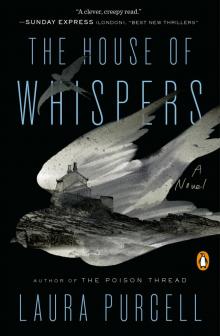 The House of Whispers
The House of Whispers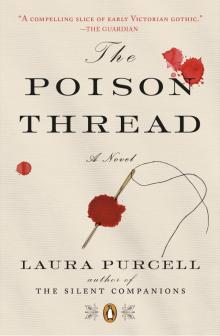 The Poison Thread
The Poison Thread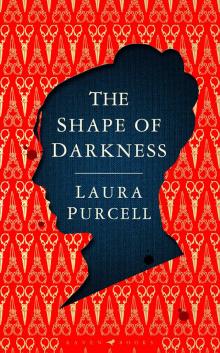 The Shape of Darkness
The Shape of Darkness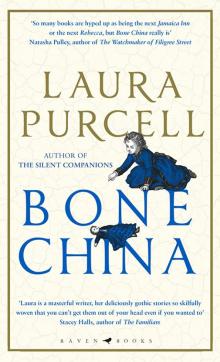 Bone China
Bone China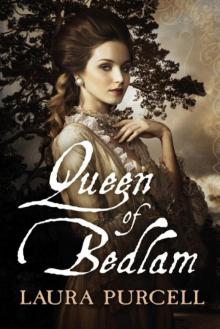 Queen of Bedlam
Queen of Bedlam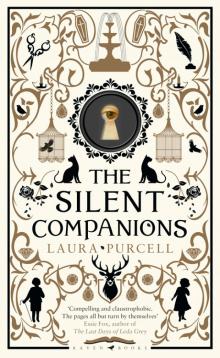 The Silent Companions
The Silent Companions